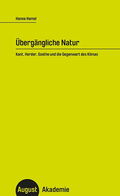Climate and the Origins of Modernity
Every cultural representation of nature is necessarily a matter of artifice, for representations will always deviate from natural phenomena. This representational problematic is particularly true when it comes to the subject of climate. More so than a landscape, for instance, the climate withdraws from and resists artistic and theoretical circumscription, or even abridged description. For climate does not manifest itself in isolated, concrete forms that can be experienced and contemplated. Instead, climate reveals itself through meteorological events that create patterns, which only emerge over time. Measurements, analysis and prognoses need to be applied to these events so that they can be linked together within a common framework; this larger frame is what we understand as »climate.« The scale of this entity overwhelms the observational capability of any single individual. It can only be appraised by means of long-term observation and through its effects on landscapes, physiognomies and cultures. »Climate« thus demands a representational form that is able to make sense of these long-term developments and diverse physical expressions.
This dissertation addresses the notion of climate as a theoretical and organizational means of understanding nature in the late 18th century. Working with texts by Kant, Herder and Goethe, the project aims to develop a historical typology of concepts of nature with a focus on specific strategies and forms of representation of the »natural« in this era. As a theoretical concept, »climatic« nature contrasts with the modern paradigm of a distanced observation of natural phenomena predicated upon a separation of nature and culture; the notion of climate instead suggests a porous intertwining of the two. A particular interest lies in investigating the difficulties that the concept of »climatic« nature as an unbounded, unruly element, which is formed as much as it is formative itself, posed in terms of representation. Precisely these concerns have become urgent again in today's discussions of climate change and the Anthropocene in the humanities and the arts. This dissertation, therefore, places these contemporary concerns in dialogue with the proposed typology of modern concepts of nature.
Publications
Übergängliche Natur
Kant, Herder, Goethe und die Gegenwart des Klimas
DOI 10.52438/avaa1001 (Open Access)
- Übergang, in: Michael Gamper, Helmut Hühn, Steffen Richter (eds.): Formen der Zeit. Ein Wörterbuch der ästhetischen Eigenzeiten, Hannover 2020, 383–390
- Die Zeit des Klimas. Zur Verzeitlichung von Natur in der literarischen Moderne, in: Michael Bies, Michael Gamper (eds.): Ästhetische Eigenzeiten. Bilanz der ersten Projektphase, Hannover 2019, 301–323 (with Eva Horn and Solvejg Nitzke)
- Anschauung der Atmosphäre. Zur Darstellung des “Übergänglichen” in Goethes “Versuch einer Witterungslehre,” in: Goethe-Jahrbuch 135 (2018), 47–56
- Gemäßigte Temperatur. J. G. Herders Klimatologie der Mitte, in Urs Büttner, Ines Theilen (eds.): Phänomene der Atmosphäre. Ein Kompendium Literarischer Meteorologie, Stuttgart 2017, 421–432
- Klimatologie als Anthropologie. Modellierung von Natur im späten 18. Jahrhundert, in: Forum interdisziplinäre Begriffsgeschichte 5.1 (2016), 78–89
